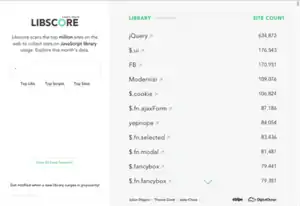Libscore
Libscore was a web-based tool that scanned the one-million most popular websites to collect statistics on JavaScript library usage. It collected data on jQuery plugins, JavaScript variables produced by non-jQuery plugins, and JavaScript libraries loaded via RequireJS.[2]
 | |
 | |
| Headquarters | |
|---|---|
| Area served | Worldwide |
| Founder(s) | Julian Shapiro |
| Key people | Julian Shapiro, Jesse Chase, Jason Chen[1] |
| Industry | Web Analytics |
| URL | libscore |
| Current status | Inactive |
Libscore provided tools intended to help developers and technical analysts compare the relative popularity of web frameworks and third-party web tools.[1][3]
Libscore was developed via a co-sponsorship by Stripe (a payments processor) and DigitalOcean (a hosting infrastructure provider).[3][4]
History
Libscore's founder, Julian Shapiro, created the project in 2014 while he was on a web development grant awarded by Stripe, a major payments processing company.[5] While developing Libscore, he brokered a partnership with DigitalOcean to participate as the project's second and final sponsor.[6] Stripe provides legal resources and covers the cost of Libscore's development, while DigitalOcean lends its technical resources to perform the monthly crawling.[4]
In May 2015, Libscore was nominated for a Net Award after competing with over 1,000 other submissions.[7][8]
In June 2015, Libscore 2.0 was released, which introduced the ability to compare the popularity of libraries over time. It also provided comparative graphing, for comparing library growth trends against one another, and auto-suggest to make library searching easier.[1]
As of October 2020, the Libscore website is unavailable. z
Behavior
Libscore scans the top million sites on the web to determine which third-party JavaScript libraries are installed on each site. Developers can use this data to determine which libraries are trending in popularity, which libraries are in use on popular sites, and how libraries' market penetrations compare. This data helps developers perform competitive analysis and make informed decisions when choosing libraries to work with.[9]
For each site Libscore scans, it runs heuristics to determine which window variables are produced by third-party JavaScript libraries. In addition, it catalogues the presence of external JavaScript scripts. Thereafter, via the Libscore homepage, users can search through the aggregated data in order to:
- Find the prevalence of a specific JavaScript variable
- Search for sites containing a specific external script
- Find out which JavaScript libraries are being used on a specific site
Libscore also provides monthly statistics on the top libraries, scripts, and sites, in addition to regularly publishing charts showcasing library adoption percentages.
There is also a Libscore API that provides developers programmatic access to Libscore's monthly data.
See also
- Common Crawl
- Internet Archive
- BuiltWith
References
- Alexander Taub. "Major Contributor To Open Source Technologies, Julian Shapiro, Pulls Back the Curtains on SAAS Usage". Forbes.
- Paul Krill (18 December 2014). "jQuery reigns as top JavaScript library". InfoWorld.
- Owen Williams. "Libscore Helps Developers Choose Javascript Libraries". The Next Web.
- Julian Shapiro. "Stripe, San Francisco, and Velocity.js". Medium.
- "Open-Source Retreat grantees". stripe.com.
- "Libscore launches to track the most popular JavaScript libraries on the web - VentureBeat - Dev - by Kia Kokalitcheva". VentureBeat.
- "Best Collaborative Project". thenetawards.com. Archived from the original on 2015-06-23.
- "Voting opens for the net awards 2015 | Web design". Creative Bloq. 2015-05-15. Retrieved 2015-10-12.
- "Libscore Aims to Measure Popularity of JavaScript Libraries". ProgrammableWeb.
